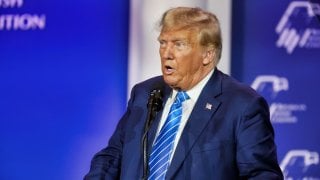Donald Trump Was a Big Failure as President
There are multiple examples of Donald Trump correctly identifying a major problem the United States faced and then failing to adequately address it.
Donald Trump rode to power in 2016 largely because of his populist rhetoric coupled with the deep unpopularity of Hillary Clinton in key swing states (that Clinton had taken for granted).
One of the most energizing components of Trump’s unconventional campaign to become the forty-fifth President of the United States was his promise to “drain the swamp”.
Trump vowed to be the Forgotten Men and Women of America’s avenger. He wanted to be the Right-wing’s ideological battering ram that would beat down the gilded doors of power and push out all the corrupt and squabbling bureaucrats. In their place, Trump would hire the “very best people” who would usher in a new golden age in which America became great again.
Yet, by the end of Trump’s first (and thus far only) term in office, the US government grew at an astounding level and federal government spending expanded at an historic clip.
Trump, the ultimate outsider, relied on typical Washington insiders to accomplish his purported populist vision.
Instead, Trump presided over an administration that was plagued with in-fighting, key personnel shortages, and poison pill hires who undermined and weakened Trump’s presidency from the inside.
The Deep State
One of the defining features of the Trump presidency was his (in some cases, justifiable) paranoia that the Faceless Men of the so-called “Deep State” in Washington, D.C. were always conspiring to destroy his presidency and ruin his life.
From his early vows to “drain the Swamp” in Washington, D.C., to his constant warnings that the Swamp was out to get him, rarely did Trump’s colorful rhetoric match his actions as the chief executive of the federal government.
Once Trump was out of office, he told several acquaintances of mine, when pressed by them, that he had, in fact, drained the Swamp. Prompting my colleagues to remind Trump that he was sitting in Mar-a-Lago in what should have been his second term while “Sleepy” Joe Biden was in the Oval Office, presiding over an administration staffed by the worst swamp creatures imaginable.
But, Trump insisted that his mission to drain the DC Swamp had been a resounding success. It was unclear of this was just another coping mechanism by a defeated president or if he really believed this.
In fact, (and I write this in my best narrator voice in mind), Trump had not drained the Swamp.
The Swamp had drowned Trump politically. The former president was desperately clawing and scratching his way to the surface from beneath the stifling vines and roots of the dark, D.C. political environment that had swamped the Manhattan real estate mogul-turned-reality-television star.
There are multiple examples of Donald Trump correctly identifying a major problem the United States faced and then failing to adequately address it. Remember that an animating aspect of his 2016 campaign was Trump’s concerns about the porous southwestern border with Mexico.
Trump had packed entire convention halls around the country and hosted rambunctious rallies populated by raucous voters who fundamentally believed that illegal immigration and all the problems associated with it was the greatest threat to this country.
Trump promised to fix it by building a “big, beautiful wall.” And then, for good measure, playfully assuring his rapt audiences that, if elected president in 2016, he’d ensure that “Mexico would pay for it!”
Donald Trump Sells the Dream...or a Fraud...
In real estate, Trump’s first profession, this is called “selling the dream.” And Trump, who made gobs of money from the real estate world, was a master at “selling the dream.”
The vow to make Mexico pay for a wall that Republicans in Washington—and even Democrats in the 1990s—had long promised to build, but never actually did construct, was the epitome of Trump “selling the dream” to a group of disaffected, rightfully upset Americans.
Most of Trump’s voters derived from the working-and-middle-classes of America.
These groups (particularly the white, working-class) were the most seriously disrupted by Globalization (which brought with it at least a tacit acceptance of mass illegal immigration, and free trade among America’s political elite in both parties).
Those voters wanted a candidate who would represent them in Washington. They wanted someone from the outside who could march into the sterile halls of power, knock out the Faceless Men who were hurting them and their communities with awful policies, and institute the policies that would make this country as great as it was 40 years ago.
No other candidate from either party spoke in the way that Donald Trump did because most didn’t believe it.
Only Donald Trump had the gumption to say such things and to generate interest from voters in ways that hadn’t been experienced in decades. The only problem for Trump is that he was never able to match his soaring rhetoric with the realities of governance.
Because of his failure to either enact his sweeping policies or to drain the Swamp, he was usurped in 2020 by a man who, despite his grandfatherly appearance and continual appeals to our democratic nature, is anything but democratic or friendly.
Joe Biden is the Anti-Democracy Candidate
Since taking power, President Joe Biden has weaponized the federal government to crush dissent, wrongfully pursue Biden’s political foes—notably Trump, who is again running for president—and pressure our social and news media firms into doing his partisan bidding.
Whatever the failures of Donald Trump (and there are many, both politically and personally), the fact remains that he is not the true threat to our democracy that his enemies accuse him of being.
Trump never weaponized the government to enforce his partisan goals. He never pressured the media to do his bidding. Biden, the supposed savior of our hallowed democracy has done all these things—and he threatens to do even more.
Should Trump again become the GOP’s nominee for president which, as of now, it appears that he will be, the key theme of the 2024 Election will become elites versus outsiders.
Trump is already forming the outlines of this campaign by using his seemingly endless indictments as a cudgel with which to bash his Democrat foes.
To many voters, it looks as though the Democrats under Biden really are weaponizing the federal government to prevent a political opponent from effectively challenging Biden in the election.
It’s a strange pattern to witness, but the more indictments that Trump is hit with by the Biden-led Department of Justice, the more popular he becomes among voters (especially Republican voters but also voters in key swing states).
This superficial narrative will last only so long.
Trump’s Abilities Rarely Matches His Rhetoric in Politics
Trump is a master at “selling the dream” to his followers and fence-sitting voters—especially when he compares himself to deeply unpopular Democratic Party opponents, such as Joe Biden (and Hillary Clinton in 2016). What will matter in the long-term is if Trump truly believes his rhetoric.
What will matter most, however, is if Trump can act on these beliefs that the system has been rigged by the elites against the common American and that he is their tribune.
While Trump may be selfish and an obnoxious braggart who routinely overstates his case, the fact remains that our system is rife with corruption. The Democrats have proven they are both unable and unwilling to “drain the Swamp” (because they disproportionately benefit from it).
If Trump does, in fact, become the GOP nominee in 2024, he will be the only person standing between our ailing republic and its ultimate demise.
Yet, voters should be concerned because, as was noted above, Trump has an uncanny ability to identify serious problems and then fail to address them in any meaningful way.
About the Author
Brandon J. Weichert is a former Congressional staffer and geopolitical analyst who is a contributor at The Washington Times, as well as at American Greatness and the Asia Times. He is the author of Winning Space: How America Remains a Superpower (Republic Book Publishers), Biohacked: China’s Race to Control Life (Encounter Books), and The Shadow War: Iran’s Quest for Supremacy (July 23). Weichert can be followed via Twitter @WeTheBrandon.
Image Credit: Gage Skidmore.


